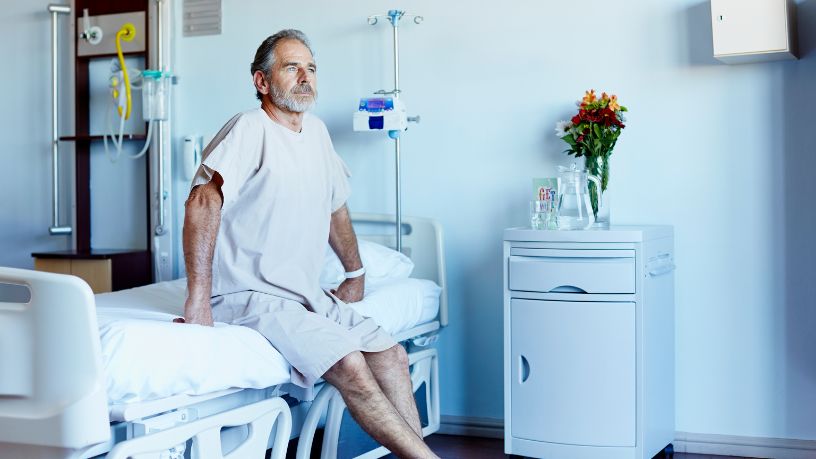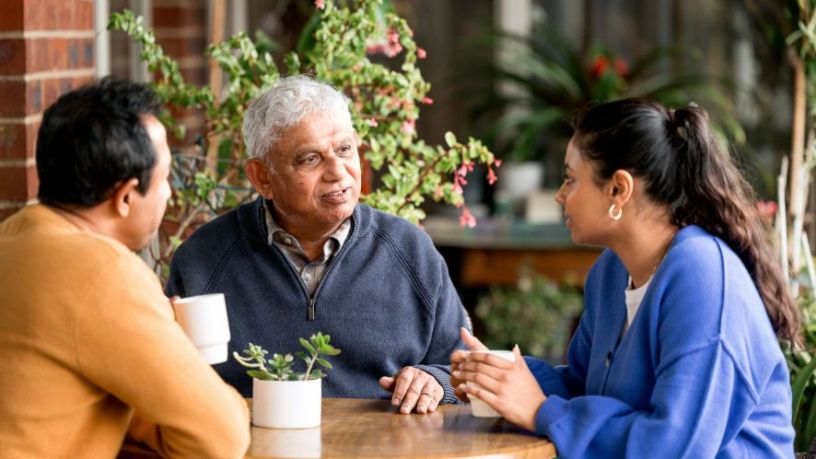After an operation, it’s important to focus on rest and recovery.
On this page
Key takeaways
Follow your treating team’s advice and to listen to your body for any concerning signs or symptoms.
Post-op recovery can be challenging, so be kind to yourself and ask for help when you need it.
There’s a lot to think about when you’re going in for an operation, from preparing yourself mentally and physically, to meeting your treating team, to figuring out what you need to pack for the hospital. But what about after your operation?
Recovery starts in hospital and continues when you go home. It’s not always straightforward and the process is different for everyone, but these tips may help to make your journey more comfortable.
1. Listen to your treating team
It’s important to follow all of your treating team’s advice at the hospital and at home. While this might seem obvious, it can be easy to lose track of things while you’re trying to recover.
This might include how to care for your wound, sticking to your medication schedule, or resting. It could also include remembering to book and attend follow-up appointments or steering clear of things like smoking, alcohol and certain medications.
If you know you’ll have trouble keeping track of everything, it could help to bring a notepad and pen along to your appointments (both before and after your operation) so you can take down anything important.
It’s also important to listen to your body as you recover. You should report things like new or unusual pain, symptoms or fatigue to your treating team as soon as you can.
If you need urgent medical help, go to the hospital right away or call 000 for an ambulance.
2. Stay active
While rest is essential for your recovery, it’s also important to keep your body moving after your operation.
Your treating team will probably recommend starting things off slowly, as even light movement can help improve things like muscle loss, bone health, and anxiety and depression.1 This could include doing light exercises from your hospital bed, such as arm raises, ankle circles and deep breathing.1 Once you’re back at home, your team might suggest increasing your activity to things like walking and stretching. It’s vital that you speak with your treating team about what physical activity you can and can’t do during your recovery.
3. Set up your living space
A little preparation can go a long way when you’re coming home from hospital. There are a few things you can do around the house before your operation to make your recovery more comfortable, including:
- moving furniture to make easier paths to walk and to prevent bumps and falls (particularly if you’ll be using a mobility aid)
- installing slip mats and handrails in your bathroom
- creating more convenient spaces for sleeping and resting (such as setting up a bed on the ground floor if you usually sleep upstairs).
If your mobility will be affected after your operation, you might also need to arrange a mobility aid, such as crutches, a wheelchair or a walking stick. Things like reaching aids can also be handy for grabbing pantry items or getting something from a high shelf without having to stretch.
Staying entertained during your recovery can help you pass the time and keep your mind engaged, so you may also want to set up a little entertainment space. Think about some feel-good movies and TV shows you’d like to watch, grab a crossword book, some cards or board games, and pop a few books by the couch.
4. Focus on your post-op nutrition
A well-balanced diet is crucial to your recovery. It can be tempting to rely on takeaway and pantry snacks, but in order to stay healthy and reduce your risk of chronic disease, it’s recommended that your diet includes a healthy mix of:
- fruits and vegetables
- protein (such as lean meat, poultry, fish, tofu and legumes)
- wholegrains
- dairy (or alternatives).2
It can be tricky to prepare meals at home after an operation, but there are a few ways you can make sure you’re getting the right nutrition while you recover:
- cook meals ahead of your operation and store them in the freezer
- ask a friend or loved one to cook for you
- sign up to a food delivery service.
It’s also important to stay hydrated during your recovery, so make sure you have a water bottle in easy reach at all times!
Member Health Programs
Discover health cover that's right for you with a range of personalised programs and services designed to support your health and wellbeing.
5. Be patient with yourself
Recovery takes time, so it’s important to be patient with yourself even when progress feels slow.
Pain, fatigue and frustration can cause a range of moods and emotions. This is a normal part of the healing process and can often be worked through with time and support.
If you find yourself feeling frustrated or impatient, consider paring back your recovery goals so that they’re smaller and more manageable. For instance, if your goal is to do a specific recovery exercise that you find challenging, try building up to it with a less intensive one.
It’s also important to move at your own pace, both physically and psychologically. If you’re not up to having regular visitors yet, there are other ways to stay connected, such as group messages and video calls.
If you’re worried about your mood or mental health, make sure you talk to someone about it right away. You can reach out to a family member, friend, your GP or a mental health practitioner.
If you’re ever in crisis or need immediate support, call 000.
6. Plan for help if you need it
Recovery is a time to focus on yourself, but that doesn’t mean you need to do it alone. It can be useful to organise a helping hand while you’re off your feet.
This could be as simple as asking a neighbour to take out your bins for a few weeks, getting a friend to drop in every other day with groceries, or arranging for a family member to do some cooking. If you have more specialised needs, you may need to talk to your treating team about professional care.
If you live alone, it’s also a good idea to have someone check in with you every day, particularly during the early stages of your recovery. This can give you and your loved ones a little peace of mind, and help you stay safe and connected during your recovery.

At Bupa, trust is everything
Our health and wellbeing information is regularly reviewed and maintained by a team of healthcare experts, to ensure its relevancy and accuracy. Everyone's health journey is unique and health outcomes vary from person to person.
This content is not a replacement for personalised and specific medical, healthcare, or other professional advice. If you have concerns about your health, see your doctor or other health professional.
1National Health Service. (2024). Bed Exercise. National Health Service.
2Better Health Channel. (2024). Healthy eating and diet. Victoria State Government, Department of Health.
You might also like
Post-Op Alert: The symptoms you should never ignore
Post-op recovery can be a bumpy ride. Learn how to get the care you need after an operation and how to spot serious recovery red flags.
Injury prevention and rehabilitation
Getting back into life after an operation
It can be hard to get back into the swing of things following an operation. These strategies may help you navigate the process.
Injury prevention and rehabilitation
How to let people know you're still recovering
When you’re recovering from an operation, injury or treatment, it’s important to move at your own pace. Find out how to tell people that you need more time.
How to mentally prepare for surgery
Physical preparation is one thing, but how can you mentally prepare for surgery?





